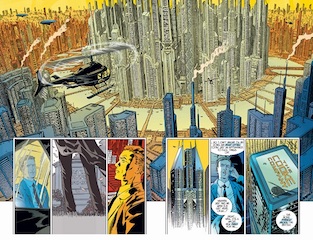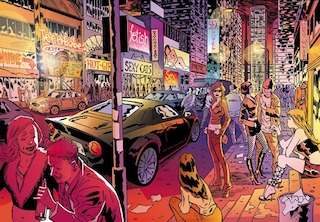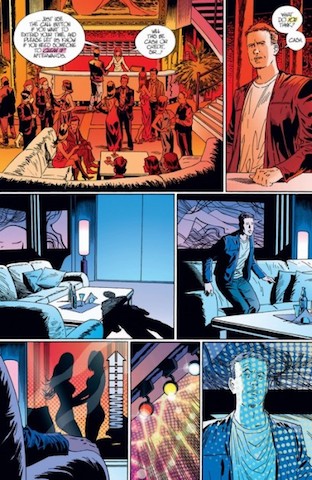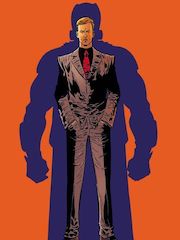![]() Sex (Vol. 1): Summer of Hard by Joe Casey (writing) and Piotr Kowalski (art)
Sex (Vol. 1): Summer of Hard by Joe Casey (writing) and Piotr Kowalski (art)
or, Considering Ethics and Literature:
I have been hesitant to read Joe Casey’s Sex because it seems like such a blatant attempt to gain the type of readership of which I did not want to be a part. However, I recently decided I should not judge so harshly before reading it. I must admit, now, that I am impressed with the first eight issues: Sex is a fantastic story with an actual point to it, and it is not simply an indulgence in gratuitous sex. However, later in my review, I will address the graphic content (to put it mildly), which will offend many potential readers, and this content should make you pause a long time before even considering reading Sex. Every type of sex is portrayed; even those resulting in murder. I feel I must say this up front.
The story is a seemingly simple twist on the superhero genre: Simon Cooke, once the great protector of Saturn City, has retired from his Batman-like mission. He, like Bruce Wayne, runs a powerful corporation, and after a leave of absence, he has returned to take on his businessman role seriously. In this new civilian life, he runs into his previous nemesis, an attractive woman based on Catwoman. She now runs an upscale sex parlor. We also see what has happened to the down-and-out Prank Addict — the Joker substitute — and we meet the real villain of the piece, The Old Man, though I am not sure what Batman villain he might represent.
 Why is this story not simply a rehash of Batman with a lot of sex thrown in? First of all, Casey is questioning the adolescent nature of the superhero genre. He is aiming his work at an adult audience familiar with superhero comics, and he is asking this older readership to consider whether they might have grown out of this genre, a point Casey makes in an interview. Casey also says he was interested in finding out if scenes of sexual fetish could just as easily replace the fetish of superheroes. Both of them seem to involve costumes and role-playing of a similar type — and extremes of both would lead to serious and disturbing violence when looked at realistically.
Why is this story not simply a rehash of Batman with a lot of sex thrown in? First of all, Casey is questioning the adolescent nature of the superhero genre. He is aiming his work at an adult audience familiar with superhero comics, and he is asking this older readership to consider whether they might have grown out of this genre, a point Casey makes in an interview. Casey also says he was interested in finding out if scenes of sexual fetish could just as easily replace the fetish of superheroes. Both of them seem to involve costumes and role-playing of a similar type — and extremes of both would lead to serious and disturbing violence when looked at realistically.
There are realistic themes in this comic book beyond this one asking comic book readers if they have grown out of their obsession. Another of his themes involves another type of aging and maturity. Our “Catwoman” character has ruined her eyesight by using special eye-glasses in her criminal past, and now she has to wear glasses that mark her as older. As one young female employee remarks with what she thinks is a compliment, the glasses look good and remind her of a pair her grandmother used to wear. This compliment does not go over well! However, Simon Cooke is able to give an equally offhand compliment, but his kindness strikes home, since they are both the same age and there is a sexual tension that is not resolved (I find this somewhat similar to the movie Sex, Lies, and Videotape in which the sex we see is critiqued, and the sex implied and not seen is suggested to be more genuinely intimate).
 The comic book also asks questions about finding meaning in life. For example, even though Simon Cooke’s best friend and lawyer is talking about discovering what will be a very disturbing sexual fetish for most readers, this character is obviously used by Casey to talk about finding a life purpose of any kind: “I think all of us want something. Whatever that something is — whether it’s another person or a particular station in life or whatever — as long as you can identify it, that’s the first step to finally living your life. Not anyone else’s life. Yours. That’s an important distinction.”
The comic book also asks questions about finding meaning in life. For example, even though Simon Cooke’s best friend and lawyer is talking about discovering what will be a very disturbing sexual fetish for most readers, this character is obviously used by Casey to talk about finding a life purpose of any kind: “I think all of us want something. Whatever that something is — whether it’s another person or a particular station in life or whatever — as long as you can identify it, that’s the first step to finally living your life. Not anyone else’s life. Yours. That’s an important distinction.”
Will the comic offend many, if not most, of those reading this review? Perhaps. Am I offended by it? On one level, yes, absolutely. This book does not have light sex scenes. It has the most graphic, most violent, awful sex scenes ever. Some scenes are so incredibly disturbing that I will not describe them here. If this story were done as a film or written in a novel, I could not bear to watch it or read about it. But somehow, comic books seem to address the forbidden in ways that make me just able to face it. Whether I should face this type of forbidden layer of human perversity, I remain in serious doubt. But I have done so, and must report that Joe Casey is a brilliant writer. And the artist hides much that might not be hidden in a film or novel, often letting us look away when we most want to do so.
 I must also conclude that Casey, while writing an explicit comic, is critiquing almost all the explicit sex we see. In other words, my moral compass in many ways aligns with Casey’s, but I am not sure we should ever see what he critiques. Does the portrayal of these acts become more offensive than any criticism of them can ethically counteract?
I must also conclude that Casey, while writing an explicit comic, is critiquing almost all the explicit sex we see. In other words, my moral compass in many ways aligns with Casey’s, but I am not sure we should ever see what he critiques. Does the portrayal of these acts become more offensive than any criticism of them can ethically counteract?
Consider, for example, how art deals with another disturbing topic: Murder. Most of us watch murders in movies all the time; at what point do we think that the type of portrayal we see ethically outweighs the critique of that which is being portrayed? And why does it seem worse when sex is involved? And why does sex, most of which is not connected to death in this book, sometimes seem more offensive than the murders we read about in novels and see in movies all the time? What does this say about a person’s ethics? What does this say about my ethics? It certainly gives me pause, particularly since I review books with murder in them all the time, and yet I do not spend as much time as I am now dwelling on the connection between ethics and art in my book reviews.
Should I take off one, two, three, or four stars for offensiveness? That seems like an odd question to me. This book is either a five-star comic or a negative five-star comic, and it will depend upon the reader. I have never read a book that is so offensive while I still believed it actually had merit and themes beyond the disturbing images portrayed. It is also one of the most beautiful comics I have ever seen: Joe Casey picks some of the best artists to work with (see my review of Godland), and I will now read any comic drawn by Piotr Kowalski. His images of the imaginary Saturn City are breathtaking.
 I wish I could dismiss this comic book, but I cannot. It is a work of great thematic daring, and it deconstructs to a more extreme the sexual fetish of the superhero genre that Alan Moore critiqued in a lighter manner in The Watchmen. You read that correctly: The Watchmen is lighter than Sex.
I wish I could dismiss this comic book, but I cannot. It is a work of great thematic daring, and it deconstructs to a more extreme the sexual fetish of the superhero genre that Alan Moore critiqued in a lighter manner in The Watchmen. You read that correctly: The Watchmen is lighter than Sex.
Sex is only for some, but it certainly masterfully achieves what it sets out to do. Whether it should ever have set out to do what it does is up to the reader to decide. I cannot make that decision in this review because I am still thinking about this comic that I finished less than an hour ago. However, I can say that the comic fulfills its goals perfectly, and I feel uncomfortable faulting literature for offending my sense of morality. Is the rating about my approval for the content or for the artistic achievements met based on the goals implied by the art itself? I think the second is the case, and based on that alone, I give Sex five stars while withholding any recommendation that you read it! And thus ends the strangest five-star review I have ever written.
More words on Art and Ethics:
Reading is an intimate act, perhaps more intimate than any other human act. I say that because of the prolonged (or intense) exposure of one mind to another. -Harold Brodkey
Literary criticism should be completed by criticism from a definite ethical and theological standpoint. The “greatness” of literature cannot be determined solely by literary standards; though we much remember that whether it is literature or not can be determined only by literary standards. -T. S. Eliot
Men become what they contemplate. -Austin Warren
[Art] is civilization’s single most significant device for learning what must be affirmed and what must be denied. -John Gardner
A work of art is a bridge, however tenuous, between one mind and another. -Andrew Harrison
A book at the time [it is written] is a good or bad action. -Jean-Paul Sartre
Surely one of the novel’s habitual aims is to articulate morality, to sharpen the reader’s sense of vice and virtue. -John Updike
The act of getting a story or a novel published is an act of communication, an attempt to impose one’s personality and beliefs on other people. If a writer accepts this responsibility, he must see himself as an architect of the soul. -Doris Lessing
As novels are about the ways in which human beings behave, they tend to imply a judgment of behavior, which means that the novel is what the symphony or painting or sculpture is not — namely, a form steeped in morality. We still cannot prevent a moral attitude from creeping into our purely aesthetic assessment of a book. -Anthony Burgess
Speech in its essence is not neutral. -Kenneth Burke




I like how much you grappled with your conflicts on the page, to let us see what the experience of reading it is like.
I have always thought it was weird that sexuality was more forbidden than violence and murder, and you make a really good point. What does that say about us? And I love the question, “Do you outgrow superheroes?” (while noting that I certainly haven’t).
Thanks for a complex and thoughtful review.
Thank you for your kind comments, Marion. I almost didn’t post this review I was so uncomfortable even writing about the comic.
I should have written this review:
DNF: I was so offended I couldn’t get past the first issue.
Instead, I actually admitted to reading it!
The first volume is a bargain, by the way:
8 issues for $10
the first 30+ issues are on sale for 80 cents a piece on Comixology this weekend.
Except I’m warning everybody that I’m not recommending that you read it.
great thoughtful review Brad! How does the graphic sexual nature compare to something, say, like Saga?
I was wondering this, myself!
There really is no comparison.
In all seriousness, the difference would be about PG-13 vs. XXX. Maybe PG vs XXX.
Sin City vs Sex? R vs XXX.
I kid you not at all. Frank Miller seems light comparatively. Even Lost Girls by Alan Moore is lighter.
And I have seen plenty to be shocked by and have become desensitized to a large degree, I am sad to admit. So, I’m wrestling with serious issues in this review.
It’s really really shocking, and the violence is really really harsh. And they sometimes combine the two (murder + sex) and well, that’s just messed up.
To be honest, once it was women in retaliation, which I didn’t mind in the setting of a deeply dark adult noir narrative. They were prostitutes making clear there was a line not to be crossed. They, of course, paid the ultimate price, as you would expect in a society such as ours.
The other time, it was beyond awful, and I think unnecessary. But it certainly lets us know the full depravity of the villain.
thanks for that clarification. As intriguing as your review made it sound, I’m thinking I’ll pass on this one, despite the little voice in my head telling me to reconsider . . .
Ignore the little voice. That’s the devil on your shoulder, Bill. Listen to the angel this time.
where were you in my teen years with that advice Brad? :)
At that time, I was probably too busy listening to the little devil on MY shoulder!